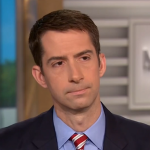Nonpartisan congressional analysts say eliminating the penalty for not buying health insurance would increase average premiums on the individual market by 10 percent. That, in turn, would result in some people deciding not to buy health coverage for financial reasons.
Yet Republican Sen. Tom Cotton claimed that the amended Senate tax bill revoking the penalty would have “no impact on anyone” who wants to buy insurance through the exchanges established by the Affordable Care Act.
Cotton made that statement during a Nov. 19 interview on CBS’ “Face the Nation.” Host John Dickerson asked Cotton about the Congressional Budget Office and Joint Committee on Taxation’s estimate that, starting in 2025, 13 million fewer people would have health insurance if the penalty for failing to comply with the Obama-era health care law’s individual mandate is repealed.
Dickerson, Nov. 19: Okay. Let’s move on to tax reform. Thirteen million people will be without coverage if the individual mandate is removed as you’d like to see in this tax cut plan. What happens to those 13 million?
Cotton: Well, John, remember what the hated Obamacare mandate is. It fines an American family. They can’t afford their insurance — insurance that Obamacare made unaffordable in the first place. So this bill doesn’t cut a single dime from Medicaid, it doesn’t cut a single dime from the insurance subsidies, it doesn’t change a single regulation in Obamacare. It simply says the IRS cannot fine you if you cannot afford health insurance. So this has no impact on anyone who wants to get health insurance under Obamacare’s individual exchanges or under the Medicaid expansion under their employer’s plan.
Cotton’s office didn’t respond to our request for an explanation.
However, the CBO and JCT estimate that the bill would have an impact on some Americans who want to buy insurance on their own, on or off the exchanges.
Eliminating the penalty would produce results “very similar” to repealing the individual mandate, CBO and JCT say. The latter would result in, among other outcomes, 13 million fewer Americans having health insurance as early as 2025, and average premiums in the nongroup market increasing by 10 percent in most years through 2027.
“Those effects would occur mainly because healthier people would be less likely to obtain insurance and because, especially in the nongroup market, the resulting increases in premiums would cause more people to not purchase insurance,” the analysis says.
Christine Eibner, a senior economist at the RAND Corporation, also contradicted Cotton.
“I disagree with the statement,” Eibner wrote in an email to FactCheck.org. “Eliminating the mandate would have spillover effects for the individual market, which includes the ACA’s marketplaces and other individual market plans.”
She added: “Specifically, it’s likely that the people who would drop individual market coverage if the mandate were eliminated would be healthy, low-cost people, who have relatively low health care utilization. If these folks drop out, those remaining on the market will be costlier, leading premiums to rise. Insurance will then become more expensive.”
By 2025, about 5 million of the projected 13 million fewer Americans with health insurance would come from the nongroup or individual insurance market, CBO and JCT say. In addition, 5 million fewer people would be enrolled in Medicaid; another 3 million fewer people would get insurance through their employer; and as many as 500,000 fewer would no longer have some other form of health insurance.
In some cases, higher premiums would be offset by higher government subsidies in the form of premium tax credits. But not everyone qualifies for them.
As of February 2017, 84 percent of the 10.3 million people purchasing health insurance through federal and state exchanges, received premium tax credits, according to the Centers for Medicare and Medicaid Services. Naturally, that means 16 percent of those on the exchanges, plus the roughly 5.4 million buying off-exchange plans, don’t get those tax credits.
CBO and JCT do not specify how many would leave the nongroup market because health insurance became too expensive. At least some of them would, though.
Therefore, it’s inaccurate to claim that the proposal from Senate Republicans to stop the penalty payment would not affect anyone buying on the Obamacare exchanges, or who want to buy insurance.
We previously wrote about an inaccurate claim made by Democrats that all 13 million people would be kicked off their health insurance if the Senate bill became law.
As we said, some are expected to stop purchasing insurance for financial reasons, but many would voluntarily give up their health coverage because they would no longer be penalized. CBO’s joint analysis doesn’t say how many would willingly give up insurance and how many would find it too pricey to buy.

 FactCheck.org Rating:
FactCheck.org Rating: 